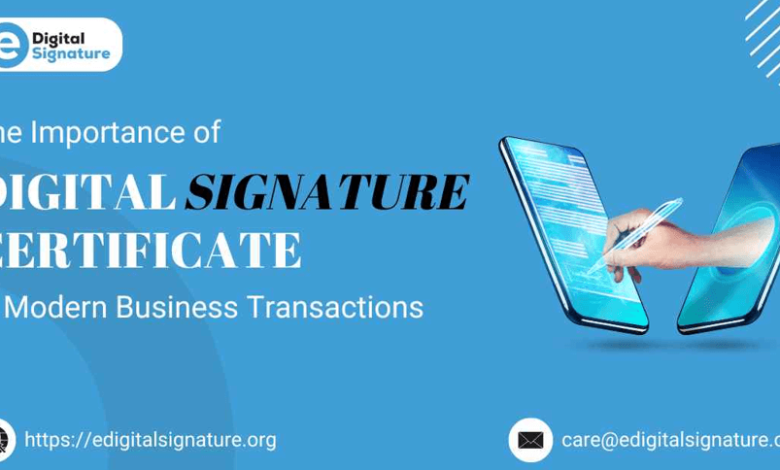The Importance of Digital Signature Certificates in Modern Business Transactions

A Digital Signature Certificate (DSC) is a digital credential that authenticates the signer’s identity and ensures the integrity of electronic documents or transactions. It is the electronic equivalent of a handwritten signature or seal, providing a secure and legally recognized way to sign digital documents, contracts, and communications.
Digital Signature Certificate are issued by licensed Certifying Authorities (CAs) after verifying the identity and credentials of the certificate holder. They typically contain the holder’s name, email address, public key, and the CA’s digital signature. The certificate also includes a unique cryptographic key pair, consisting of a private key known only to the certificate holder and a corresponding public key that can be shared with others.
Enhancing Security
Security is paramount in any business transaction, especially when sensitive information is involved. Digital Signature Certificates play a pivotal role in ensuring the authenticity, integrity, and confidentiality of digital documents. Unlike traditional handwritten signatures, which can be forged or tampered with, DSCs use advanced encryption techniques to create a unique digital fingerprint for each document.
By affixing a digital signature to a document, the sender can prove their identity and guarantee that the content has not been altered since the time of signing. This not only protects businesses from fraud and unauthorized access but also instills confidence in customers and partners that their data is safe and secure.
Streamlining Processes
In addition to bolstering security, DSCs help businesses streamline their workflows and accelerate decision-making processes. Gone are the days of printing, signing, scanning, and emailing documents back and forth. With DSCs, transactions can be completed entirely online, saving time, resources, and paper.
Whether it’s signing contracts, approving purchase orders, or filing tax returns, DSCs enable businesses to execute transactions with greater efficiency and agility. This is particularly beneficial for organizations operating in global markets, where traditional paper-based processes can be cumbersome and prone to delays.
Ensuring Legal Compliance
Compliance with regulatory requirements is a top priority for businesses across industries. Digital Signature Certificates provide a legally recognized framework for electronic transactions, ensuring compliance with various national and international laws, such as the Electronic Signatures Act (ESIGN) in the United States and the Electronic Identification and Trust Services (eIDAS) regulation in the European Union.
By using DSCs, businesses can demonstrate compliance with stringent legal standards, mitigate risks associated with non-compliance, and avoid costly litigation. This not only fosters trust and credibility among stakeholders but also facilitates cross-border transactions in an increasingly globalized economy.
Facilitating Remote Collaboration
The rise of remote work and decentralized teams has made collaboration more challenging than ever. Digital Signature Certificates bridge the gap by enabling secure and efficient remote collaboration on documents and contracts. Whether team members are located in different cities or continents, they can sign and exchange documents in real-time, without the need for physical presence.
This not only improves productivity and collaboration but also reduces the environmental footprint associated with traditional paper-based processes. With DSCs, businesses can embrace the flexibility of remote work while maintaining the highest standards of security and compliance.
Reducing Operational Costs
Traditional paper-based transactions incur significant costs associated with printing, postage, storage, and manual processing. By transitioning to digital signatures, businesses can dramatically reduce these operational expenses while improving efficiency and sustainability.
Digital Signature Certificates eliminate the need for paper documents, postage, and physical storage space, leading to cost savings and environmental benefits. Moreover, digital transactions can be processed and archived electronically, reducing the time and resources required for administrative tasks such as document retrieval and record-keeping.
Read also: Udyam Registration: Reducing Informality in the MSME Sector
Enhancing Customer Experience
In today’s digital age, consumers expect seamless and convenient experiences across all touchpoints. Digital Signature Certificates enable businesses to offer frictionless and secure transactions, whether it’s signing contracts, opening accounts, or completing purchases online.
By integrating DSCs into their digital platforms and applications, businesses can streamline the customer journey, minimize friction points, and enhance the overall user experience. This not only improves customer satisfaction and loyalty but also strengthens the brand’s reputation as a trusted provider of secure and reliable digital services.
Embracing Innovation
As technology continues to evolve, Digital Signature Certificates are evolving as well, incorporating advanced features such as biometric authentication, blockchain integration, and artificial intelligence. These innovations enhance the security, usability, and scalability of DSCs, paving the way for new applications and use cases in areas such as decentralized finance, digital identity management, and smart contracts.
By staying abreast of emerging trends and innovations in digital signature technology, businesses can future-proof their operations and unlock new opportunities for growth and innovation in the digital economy. Digital Signature Certificates are not just a compliance requirement but a strategic enabler of innovation and competitive advantage in today’s dynamic business landscape.
Also Read: Class 3 Digital Signature
Conclusion
In conclusion, Digital Signature Certificates are essential tools for modern businesses seeking to enhance security, streamline processes, ensure legal compliance, and facilitate remote collaboration. By leveraging the power of digital signatures, businesses can unlock new opportunities for growth, innovation, and success in today’s digital economy. Embracing DSCs is not just a matter of convenience but a strategic imperative for staying competitive in an increasingly digitized world.





